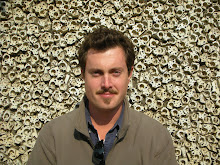
[
zzzz. zzzzyzzzzx. zzzSNAP.
What the... Poopytrip! What month is it? September!? Okay... wellywell... Time for a bit of the ol' pipecleaner on the brainside. Don't we all need that from time to time? Like when it's been six weeks of monkeyshit in between you and your last blog post? I owe apologies to everyone who has logged on and been forced to witness the Basketcase-esque abomination that is two Wayanses latched together in a frontal-papoose-style arrangement. Scusilo. Je m'excuse. Et cetera. Ad infinitum.... So here's what I've been working on that will never get a full-length, exhaustive (read: boring) examination in these pages. Consider these open letters as being written to whomever* might be the intended recipient. Peace.]
Mick Jagger and the Rolling Stones and NASCAR: There was an ad that hyped the TNT (read: AOL-Time/Warner) airings of NASCAR races, which are in the first place incomprehensible; in the second, inexcusable. I write this, mind you, as a man who spent his formative years in the American South. So take it how you will: am I merely offering apologia for My Redneck Past, or am I genuinely perturbed by Our Red States' Obsession With Men Turning Left? Take the latter. Anyway, the Stones are singing about a woman who's "Driving Too Fast" in this tune, and I can't help thinking it sounds like exactly what I'd expect from a group so...so...septuagenarian? It's a 6-minute track if you steal it, and it's only worth half that. The opening chorus goes something like: "I love you baby I love you too much. / I love you baby that I can't stop the fuss." The "fuss?" Is this some Britslang I ain't party to quite yet, or is it just lazy writing?
MJ: "Hey, Keith, what rhymes with "Much?"
KR: "Er...zzz...wha--Poopytrip! 'Fuss!'"
This is a band that rocked for a few good years (until around 1981ish) on riffs and beats lifted from The Great American Bluesmen. Now they're relegated to the rubbishbin of pop-redneck, corporate-salaried, AOL-Time/Warnerish hackery, re-examining a theme I thought Prince had killed with "Little Red Corvette."
P: "Baby, you much too fast [You got to slow dow-own!]."
Sure she drives too fast, Mick. You're old and crotchety and every old, crotchety man claims that everyone else--hot women included--drives too fast. Show the kind of restraint that Jimi and Bob and Kurt and Janis and Stevie and Hank and Woody and Buddy and Axl did and roll out with some dignity, okay?
Axl?: I'll believe he's still breathing when I hear
Chinese Democracy.
Keith Richards and the 1967 Rolling Stones Death Pool: How. I mean. Really. Is it just your cholesterol's low, or what? Were it not for the smoking cigarette dangling from your lips at the Super Bowl, I would have assumed animatronics and Disney-style floofaroo. Kudos if you're not already animatronic. If you're already all gears and pulleys, then you aren't even reading this. With that in mind...
Animatronic Rolling Stones: It's really the only stop after Johnny Depp claims your swagger as his own in a movie based on a theme-park ride. Like Gibson did with his whole Man-On-The-Cross shit.
 Mel Gibson? An Anti-Semite? Nah...:
Mel Gibson? An Anti-Semite? Nah...: Really the ugliest story, but also the most predictable. Here's a guy whose father put out white-power, pro-Nazi newsletters as part of a radical-Catholic movement in Australia while Mel was off growing the Ubermullet that would eventually gain him
Lethal Weapons 1 through
IV. So when William Wallace switches from beer to SS-and-Sevens, all manner of donkeypiss spews forth. It's wildly ironic that the man who made the most wildly anti-Semitic movie of all time (
The Passion of The Christ), when pissed, flails on and on about every Hebrew who's not already his Lord and Saviour. Pick a Jew and stick with it, Mel. Please. I liked
The Man Without A Face, really. Cross my heart. No, not that cross, Mel. Just climb down and we'll talk.
Crosses: Better than crescents or Mogen Davids? Who decides? (5 USD on the latter...takers?).
War In The Middle East: Seriously, Lebanon. What? Rocks only beat scissors, and the paper comes from Washington. Be happy with the land you have and just be done with the rest. Thanks.
Nukes In The Middle East: Oh. What? I thought that was just North Korea and Libya and Iran and India and Pakistan and aren't all of these people just pissed off at each other? At US?!?! Okay. Lebanon, listen up: Sorry about that whole last shit. We're cool as long as we're cool, y'know? Just don't do anything I wouldn't, and leave a full tank when you drop off the keys. Rightyroo, rocknroll. Speaking of...
Plane Crashes and Emmys: Congrats, Monk. Congrats, Mister Carell. Congrats, Jon Stewart. O'Brien? Nice show. Don't hold you accountable in any way for anything that happened during that telecast. Your timing's never been flawless (but neither was Johnny's), but this time the flaws found a momentary audience. Fear not: Like the Emmys, the controversy and the crash will fade into distant memory soon enough...
Oliver Stone and World Trade Center: ...until Ollie comes out WAAAAY after the starting bell, murmurs a barely audible "Poopytrip!" and sets to work assassinating your character in 2011. On peyote and Cuban hookers.
Peyote and Cuban Hookers: Um... Yeah, how much por la noche? And how much if you don't melt into David Crosby?
Robert DeNiro: Really, Bob. Dead to me. Don't even bother calling this time.
John Mark Karr: "She loves me, she loves me not. She loves me, she loves me not. I was there in the room, I wasn't even in the state. I just wanted a hug from police officers, or the FBI." Can't skinny and goofy-looking qualify as a capital offense? Please? Just once?
The Chicken I Raped With A Beer Can Last Night: Sorry. I can only imagine how that hurt. If it helps matters any: you were delicious and you were dead. And I promise I'll work that entire carcass into a bitchin' leftover-chix soup. I try to roll like a Plains Indian (feathers, not dots) with that good shit, y'know, use every part of the proverbial buffalo. Even though you can't hunt them anymore, except by private arrangement. Buffalo, that is. Black gold, West-Texas plea. Yeah, um...
Buffalo: Sorry. I meant "bison," and never meant to understate your car-knocking-over ability. Kudos to great SUV-relocation potential, and long may you prosper.
My Pillow: A great place to spend the night. Cheers and
[
zzzz...zzzzyzzzzx...zzzSNAP!]
*: Oh, or is it "whoever?" Did you really scroll all the way down here after the asterisk? There are greater problems on the horizon, mi amigo, than my grasp of interstitial M's. Focus.





